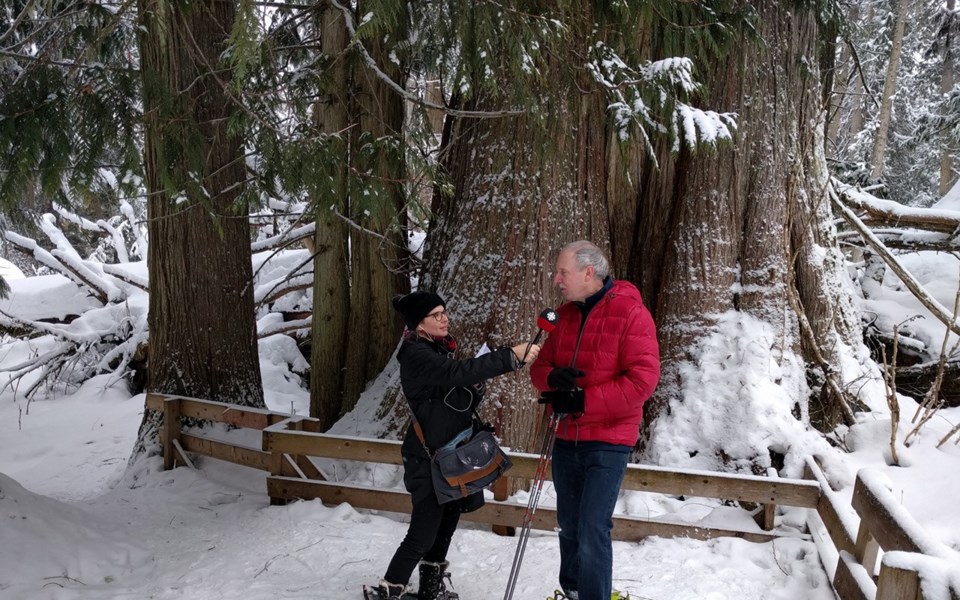A new podcast imagines our future — and it's looking pretty bleak. In 2050: Degrees of Change, CBC Vancouver senior meteorologist Johanna Wagstaffe talks to leading scientists and experts about what climate change will mean for B.C.
"We talked to over 40 scientists and experts across the province, and we were very surprised at how much change there's going to be," said Wagstaffe.
At the heart of the six-part series is an intriguing premise: the world takes action on climate change, cutting greenhouse gasses significantly. But it fails to live up to the Paris Agreement, an international accord that aims to keep global temperature increases below two degrees Celsius above pre-industrial levels.
In Wagstaffe's imagining, in thirty years global temperature rises by 2.5 degrees.
"It's a middle of the road scenario," she explained — not worse case, not best case.
The affect, however, is profound. Warmer weather leads to dramatic highs and lows and more frequent and powerful storms.
The sea level rises — by 30 centimetres. Low-lying parts of the Lower Mainland grapple with flood risk. Much of Richmond, for example, is located on land that is at or right around sea level.
Across the province, efforts to shore up dykes and create new ones cost around $30 billion.
Global warming will also result in hotter and dryer summers. And that means the province must brace for longer wildfire seasons.
"The risk for wildfires will increase," said Wagstaffe.
Fire season will likely be extended by between 30 and 50 days, depending on where you are in the province, she added.
Glaciers will be devastated: 25 per cent of them gone.
"When people come to B.C., they think of these beautiful snowcapped mountains, and particularly all our glaciers," said Wagstaffe, lamenting the loss.
"When we lose glaciers, we lose our culture."
Moreover, the province's overall snowpack will be significantly decreased — a trend that has already begun to impact "snow forests," like those in central B.C., which are largely fed by the steady stream of precipitation healthy snow packs provide.
And yes, ski hills will feel it as well.
Things will vary from year to year, but in 2050 it's going to be rare to have snow on local mountains.
Whistler, with its higher elevation, will be spared, said Wagstaffe. "Places like Whistler are in a better position than other ski resorts that are at lower elevations," she said.
But it will still be affected. The snow line will rise.
And we can expect our famous Pineapple Express systems — which generally bring heavy precipitation followed by warm weather — to be stronger and filled with more precipitation.
As bad as things look, Wagstaffe said she was encouraged by the smart people she met reporting out the story. They gave her the confidence that people are planning for this.
She also noted that relative to other places around the world, B.C. will be more fortunate.
Rising sea levels will cause "exoduses" of entire populations, particularly in low-level island nations, noted Wagstaffe.
"I think a lot of people are going to want to move to B.C. — even more than they want to now," she said.
"B.C.'s a bit of a climate oasis. We'll have to adapt to changes."
2050: Degrees of Change comes on the heels of Wagstaffe's first podcast series, which was released last year to wide acclaim.
Fault Lines is a dramatic enactment how a mega-thrust earthquake — which seismology experts believe is inevitable and could happen any day — will impact British Columbians.
"I love this medium," she explained. "When you just have a microphone, everyone you speak to is more candid," she said.
Inspired by the creativity on display in top podcasts like WNWYC'S Radiolab, Wagstaffe uses a creative narrative conceit to engage the listener.
Throughout 2050, a little girl talks to a Siri-like computer, who provides updates on the weather and its crummy implications for her daily life.
"The things that are normal to her — like heat waves and beaches being closed and sand bagging efforts — helped us set the scene," said Wagstaffe.
2050: Degrees of Change is available (free of charge) on iTunes or for download or streaming at




